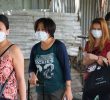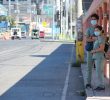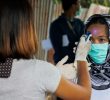DAVAO CITY, PHILIPPINES – Davao City has reverted back to general community quarantine (GCQ) with heightened restrictions after six weeks of modified enhanced quarantine (MECQ). But with the reports of COVID-19 Delta variant found in Northern Mindanao, Davawenyos wonder what steps should be taken?
The city government of Davao said they are still implementing the same protocols of border checkpoints, swab tests and tracing, and advising the public to observe health standards of masks, face shield and distancing.
Mayor Sara Duterte-Carpio said on her Monday’s radio program on the city’s Disaster Radio that the city is still facing the same virus, hence, the same measures take place for all.
“Walay laing preparation (There’s no other preparation) for COVID-19 variants. It’s the same virus, it is still COVID-19, so we still need to do the same minimum public health standards. Mao gihapon na atoang panlaban sa (It’s still the same defense on) Delta variant,” she said on her program on July 19.
The Delta variant is a mutated COVID-19 virus that reportedly spreads two times faster than the original one. The Center for Disease Control and Prevention (CDC) reports that the Delta variant was first identified in India in December 2020 and in the United States in March 2021.
The concerns on the Delta variant arose after reports of five cases detected in Cagayan de Oro City and one in Gingoog City. With these, Davao citizens asked should the city impose a ban on travelers and vehicles coming from Northern Mindanao?
No travel ban
Mayor Duterte said it is not easy to detect one is a COVID-19 carrier at a checkpoint.
“As I said, dili man makita ang tao na asymptomatic, dili visible to the naked eye ang COVID-19 virus and dili ka mahibalo kung unsang klase na variant na siya kung positive man siya (We can’t see it on an asymptomatic person, COVID-19 is not visible to the naked eye and we don’t know what variant the person has if one is positive). So, what we do is still the same, symptom screening within the border and we use the RTF-RIATF Joint Resolution (to check their) papers (when they enter) Davao Region,” she said.
Travelers entering Davao City are required to have a negative RT-PCR result and to quarantine for 14 days. Those who do not have test results will be referred to a swab test.
Davao City Anti-COVID task force spokesperson Dr. Michelle Schlosser said they will empower barangay emergency action teams in the borders to monitor travelers and enforced quarantine measures.
The city government’s tone is to rely on policies set by the Inter-Agency Task Force (IATF) on COVID-19, yet the IATF is still set to meet on possible adjustment on border controls which are crucial among other concerns.
Schlosser also said during an interview at Disaster Radio Wednesday, July 21, that they will be discussing within the task force on certain guidelines that have been raised by Davawenyos such as recent penalties meted on bicyclists.
The spokesperson also said they will carefully weigh lockdowns of establishments with positive cases among their employees.
“We’re also looking on the economic effect of the lockdown. Dili ni basta basta, (we just don’t do it right away), it’s not just the health we are looking after, but also the economy. A lockdown needs thorough risk assessment by health officers on the ground,” she said.
Testing enough?
As local governments try to figure how to deal with the Delta variant, health advocates raise concern on the government’s low capacity of tracing and genome testing.
Dr. Gene Nisperos, head of the Community Medicine for Development, said in an interview with ABS-CBN the situation may be “alarming” because “the government hasn’t done good surveillance” of local transmissions.
The DOH reported 16 cases of Delta variants, with one patient in Gingoog reportedly having no travel history. This worries Nisperos on the mode of monitoring done by DOH.
“We’re not monitoring how many people out there are infected. The 16 (cases) were taken in June. How timely are the reports we are looking at? We’re behind in the things that are happening.”
Dr. Tony Leachon, former adviser of the IATF, also agrees that “local transmission of the Delta variant is underreported due to lack of genome surveillance.”
Leachon noted areas with high positivity rates of COVID-19 such as Davao, Iloilo, Bacolod, Mariveles, General Santos, Cagayan de Oro, Baguio, and Laoag “signifies active transmission.”
“A higher percent positive suggests higher transmission and that there are likely more people with coronavirus in the community who haven’t been tested yet. We don’t know if the high number of cases are due to other variants. Thus we need to do both RT PCR and genomic sequencing,” Leachon added.
This weakness was admitted by Mayor Duterte-Carpio during her program, who said it could possible that the Delta variant is already in Davao City and that the city health could not conduct vast swab tests and genome sequencing.
Nisperos and Leachon are hoping the IATF and DOH would act fast.
“We have to prepare for the worse case scenario. We cannot say there’s no evidence of local transmission it’s not happening. We’ve heard that before last year, when the whole pandemic started. They said there’s no local transmission, there’s no need to panic. It’s not panicking, it’s the need to be prepared. People are concerned, to be vigilant if the community is prepared adequately enough for another surge,” Nisperos said.
Davao City’s COVID-19 cases have dipped significantly since May with 1,995 active cases reported by the DOH, but the city still topped the OCTA Research monitoring of the most new cases from July 13 to 19 with 219.










